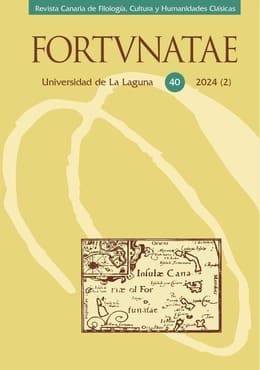Acceptance into DOAJ
Last April Fortunatae entered DOAJ (Directory of Open Access Journals).
Read more about Acceptance into DOAJ
Last April Fortunatae entered DOAJ (Directory of Open Access Journals).
Read More Read more about Acceptance into DOAJ
Issue 40 of Fortunatae includes eight articles (six in Spanish and two in Portuguese) and four reviews from Argentina, Brazil, Canada, Mexico, and Spain, thus upholding the international nature of this publication.
Luis Amela Valverde’s paper on numismatics focuses on the Roman Republican period, paying special attention to the denarii of the series RRC 455 by Gaius Antius Restio.
Reyes Bertolín Cebrián unpicks the utopian passages of The Odyssey and reveals that they create expectations that occasionally contradict the social and psychological principles of their inhabitants.
By way of the classical tradition, Gabriel Laguna Mariscal tracks the carpe diem topos in songs by The Beatles.
The humanistic debate around the Latin spoken by the Romans is presented by Fábio Frohwein de Salles Moniz in his translation proposal of a text by Bruni.
The conflicting cosmovisions of Christians and the main schools of classical philosophy (Stoicism, Platonism, and Neoplatonism) in the second and third centuries AD are analysed by Miguel Ángel Ramírez Batalla. Luis Manuel Ruiz García reviews the universal metaphors associated with the sea and water in general, in Catullus’ poem Carmina IV.
In his article, Breno Battistin Sebastiani focuses on the historiographical and philological study of the establishment of Greek communities beyond their original homelands and the implications in terms of exile, deportation, and related aspects, such as communication and support networks.
Finally, Ana C. Vicente’s semantic study examines the term κόμπος in Greek tragedy and the extensive variation of lexical derivatives.
The issue ends with four reviews of recent publications by Graham Zanker, Eric H. Cline, Manel García Sánchez, and Petrarch’s Epistolae.
The Department of Filología Clásica, Francesa, Árabe y Románica at Universidad de La Laguna (Tenerife, Canaries, Spain) holds the academic journal Fortunatae. It is published online, free of charges and free accessed. It is devoted to the research of the different disciplines attached to Ancient Philology and Ancient Studies. It aspires to reach not only scholars but also readers interested in these fields of study.
Since its foundation in 1991, it has welcomed original and unpublished research and studies by national and international authors. The journal has a broad focus and receives articles and reviews on the different literary events and new research objects that have emerged within the field of classical studies and their survival.
This work is licensed under CC BY-NC-ND 4.0
